After a top Chinese general’s trip to Moscow, M.K. Bhadrakumar sees conditions for a working and effective military alliance between the two countries forming quickly if the need arises.
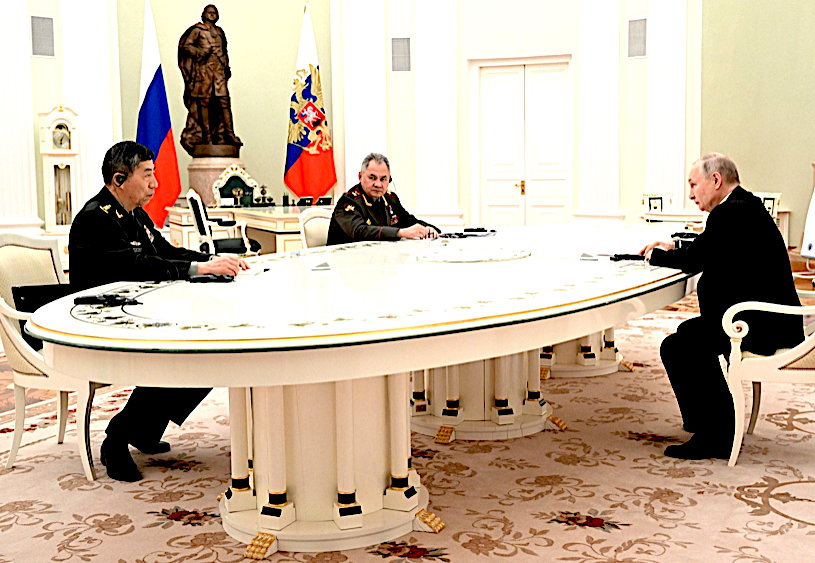
China’s Defense Minister Li Shangfu, on left, seated next to his Russian counterpart Sergei Shoigu and Russian President Vladimir Putin, on April 16. (Pavel Bednyakov, RIA Novosti)
By M.K. Bhadrakumar
Peoples Dispatch
 The official visit by Chinese State Councillor and Defense Minister General Li Shangfu to Russia on April 16-19 prima facie underscored the two countries’ emergent need to deepen their military trust and close coordination against the backdrop of worsening geopolitical tensions and the imperative to maintain the global strategic balance.
The official visit by Chinese State Councillor and Defense Minister General Li Shangfu to Russia on April 16-19 prima facie underscored the two countries’ emergent need to deepen their military trust and close coordination against the backdrop of worsening geopolitical tensions and the imperative to maintain the global strategic balance.
The visit carries forward the pivotal decisions taken at the intensive one-on-one talks between Russian President Vladimir Putin and Chinese President Xi Jinping in Moscow through March 20-21. In a break with protocol, Gen. Li’s four-day visit was front-loaded with a “working meeting” with Putin — to quote Kremlin spokesman Dmitry Peskov (here and here).
Li is no stranger to Moscow, having previously run the Equipment Development Department of the Central Military Commission, which was sanctioned by the U.S. in 2018 for purchasing Russian weapons, including Su-35 combat aircraft and S-400 surface-to-air missile systems.
Song Zhongping, prominent Chinese military expert and TV commentator, forecast that Li’s trip would signal the high level of bilateral military ties with Russia, and lead to “more mutually beneficial exchanges in many fields, including defense technologies and military exercises.”
Last week, the U.S. Commerce Department announced the imposition of export controls on a dozen Chinese companies for “supporting Russia’s military and defence industries.” The Global Times, a Chinese Communist Party paper, hit back defiantly:
“as China is an independent major power, so is Russia. It’s our right to decide with whom we will carry out normal economic and trade cooperation. We cannot accept the US’ finger-pointing or even economic coercion.”
Putin said at the meeting with Li on Orthodox Easter Sunday that military cooperation plays an important role in Russia-China relations. Chinese analysts said Li’s visit is also a signal jointly sent by China and Russia that their military cooperation will not be impacted by the U.S. pressure.
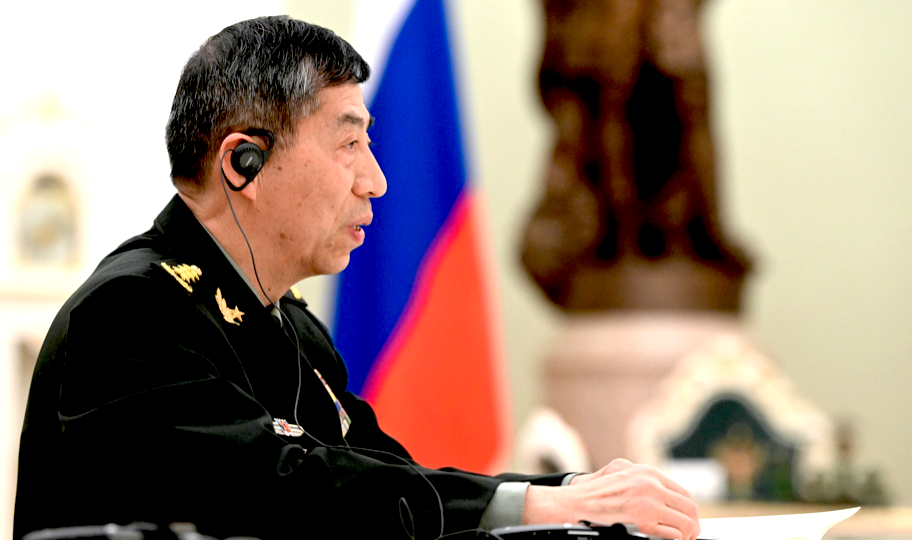
China’s Minister of National Defense Li Shangfu in Moscow during the April 16 meeting with Russian President Vladimir Putin and Russian Defense Minister Sergei Shoigu. (Pavel Bednyakov, RIA Novosti)
Putin had disclosed in October 2019 that Russia was helping China to create an early missile warning system that would drastically enhance the defensive capacity of China. Chinese observers noted that Russia was more experienced in developing and operating such a system, which is capable of identifying and sending warnings immediately after intercontinental ballistic missiles are launched.
Such cooperation demonstrates a high level of trust and requires a possible integration of Russian and Chinese systems. The system integration will be mutually beneficial; stations located in the North and West of Russia could provide China with warning data and, in turn, China could provide Russia with data collected at their Eastern and Southern stations. That is to say, the two countries could create their own global missile defense network.
These systems are among the most sophisticated and sensitive areas of defense technology. The U.S. and Russia are the only countries which have been able to develop, build and maintain such systems. Certainly, close coordination and cooperation between Russia and China, two nuclear-armed powers, will profoundly contribute to world peace in the present circumstances by containing and deterring U.S. hegemony.
It cannot be a coincidence that Moscow ordered a sudden check of the forces of its Pacific Fleet on April 14-18, which overlapped Li’s visit. The inspection took place against the background of the aggravation of the situation around Taiwan.
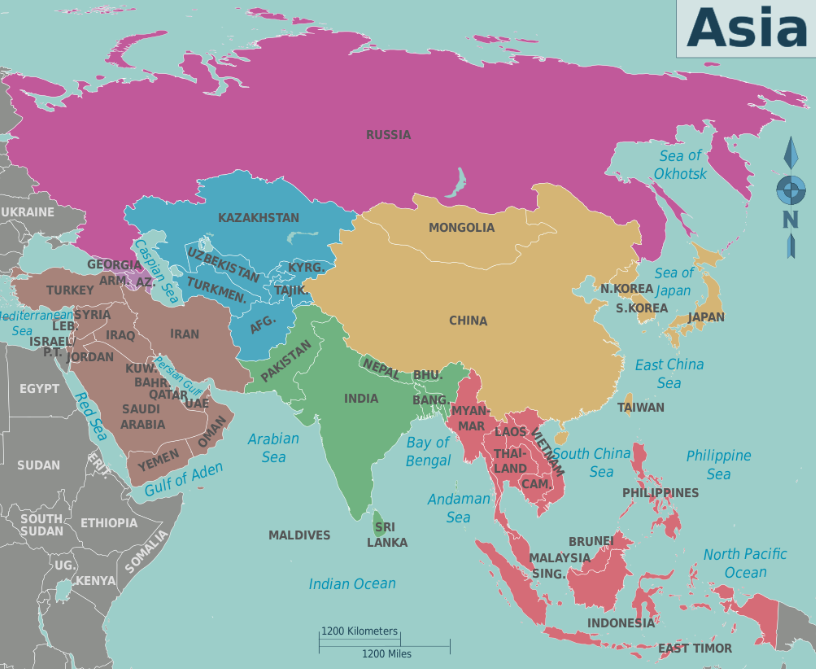
(Cacahuate, adapted by Peter Fitzgerald, Globe-trotter, Joelf, Texugo, Piet-c and Bennylin/CC BY-SA 4.0, Wikimedia Commons)
In early April, it became known that the American aircraft carrier USS Nimitz approached Taiwan; on April 11, the U.S. began a 17-day military exercise in the Philippines involving over 12,000 troops; on April 17, news appeared about the dispatch of 200 American military advisers to Taiwan.
The U.S. Global Thunder 23 strategic exercises at Minot Air Base in North Dakota, (which is the US Air Force Global Strikes Command) began last week where a training was conducted to load cruise missiles with nuclear warheads on bombers. The images showed B-52H Stratofortress strategic bombers being equipped by the flight technical personnel of the base with AGM-86B cruise missiles capable of carrying nuclear warheads on the underwing pylons!
Bomber nuke loading exercise at Minot AFB as part of #GlobalThunder23 exercise. B-52s are loaded with unarmed AGM-86B cruise missiles. With 12 missiles under the wings, each bomber could deliver 1.8 Megatons of explosive power, the equivalent of 120 Hiroshima bombs. https://t.co/AFkqT8fP6l pic.twitter.com/voXFeZRMAD
— Hans Kristensen (@nukestrat) April 14, 2023
Again, exercises of U.S. aviation and fleet forces have been increasingly noticed in the immediate vicinity of Russian borders or in regions where Russia has geopolitical interests.
On April 5, B-52 Stratofortress circled over the Korean Peninsula allegedly “in response to nuclear and missile threats from North Korea.” At the same time, South Korea, the U.S. and Japan conducted trilateral naval exercises in the waters of the Sea of Japan with the participation of aircraft carrier USS Nimitz.
Russian Security Council Secretary Nikolai Patrushev recently drew attention to Japan’s growing capability to conduct offensive operations, which, he said, constituted “a gross violation of one of the most important outcomes of the Second World War.”
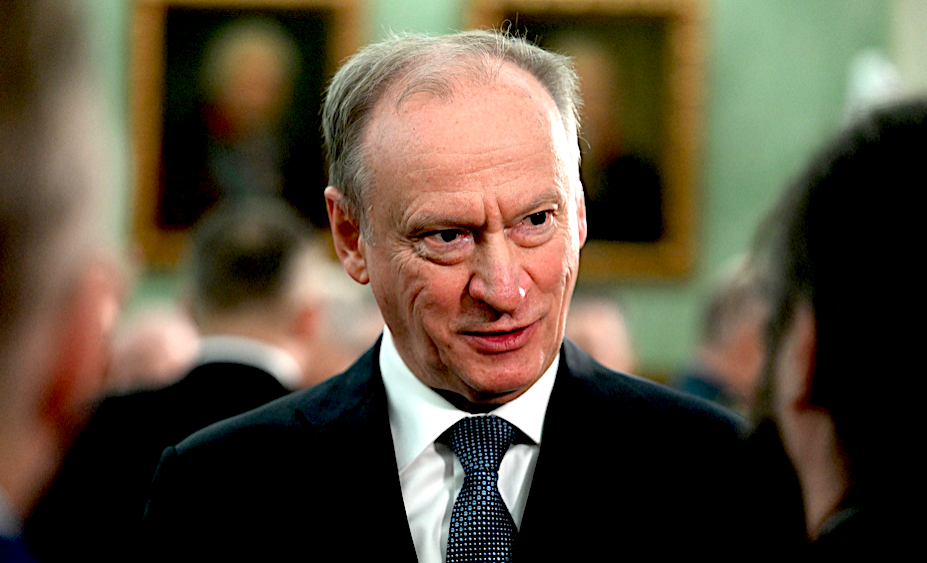
Nikolai Patrushev, secretary of the Russian Federation Security Council, in March. (Pavel Bednyakov, RIA Novosti)
Japan plans to purchase around 500 Tomahawk cruise missiles from the U.S., which can directly threaten most of the territory of the Russian Far East. The Mitsubishi Heavy Industries is working on developing Type 12 land-based anti-ship missiles “in order to protect the remote islands of Japan.”
Japan is also developing hypersonic weapons designed to conduct combat operations “on remote islands,” which Russians see as options for Japan’s possible seizure of the Southern Kuriles. In 2023, Japan will have a military budget exceeding $51 billion (on par with Russia’s), which is slated to increase to $73 billion.
Actually, during the latest surprise inspection, the ships and submarines of Russia’s Pacific Fleet made the transition from their bases to the Japanese, Okhotsk and Bering Seas. Defense Minister Sergei Shoigu said, “in practice, it is necessary to work out ways to prevent the deployment of enemy forces to the operationally important area of the Pacific Ocean – the southern part of the Sea of Okhotsk and to repel its landing on the Southern Kuril Islands and Sakhalin Island.”
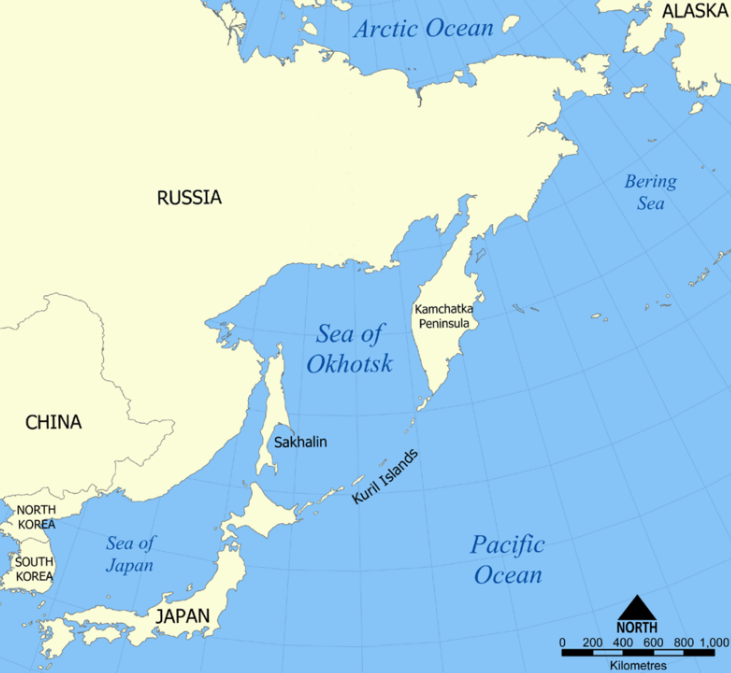
Map of Sea of Okhotsk, bordered by Russia and Japan, showing Kuril Islands. (NormanEinstein, CC BY-SA 3.0, Wikimedia Commons)
Loudly on the Quiet…
Surveying the regional alignments, Yuri Lyamin, Russian military expert and Senior Fellow at the Centre for Analysis of Strategies and Technologies, a leading think tank of the military-industrial complex, told Izvestia newspaper:
“Considering that we have not settled the territorial issue, Japan lays claim to our South Kuriles. In this regard, checks are very necessary. It is necessary to increase the readiness of our forces in the Far East…
“In the context of the current situation, we need to further strengthen defense cooperation with China. In fact, an axis is being formed against Russia, North Korea and China: the USA, Japan, South Korea, Taiwan, and then it goes to Australia. Great Britain is also actively trying to participate… All this must be taken into account and cooperation should be established with China and North Korea, which are, one might say, our natural allies.”
In highly significant remarks at a Kremlin meeting with Shoigu on April 17 —while Li was in Moscow — Putin noted that the current priorities of Russia’s armed forces are “primarily focusing on the Ukrainian track… (but) the Pacific theatre of operations remains relevant” and it must be borne in mind that “the forces of the (Pacific) fleet in its individual components can certainly be used in conflicts in any direction.”
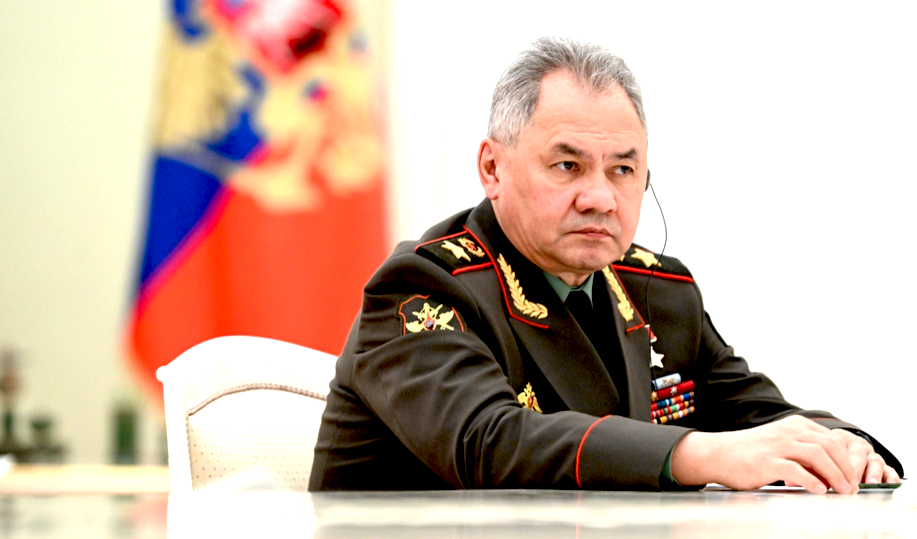
Russian Defense Minister Sergei Shoigu during the April 16 meeting with his Chinese counterpart, Li Shangfu, in Moscow. (Pavel Bednyakov, RIA Novosti)
The next day, Shoigu told Gen. Li, “In the spirit of unbreakable friendship between the nations, peoples, and the armed forces of China and Russia, I look forward to the closest and most successful cooperation with you…” The Russian MOD readout said:
“Sergei Shoigu stressed that Russia and China could stabilize the global situation and lessen the potential for conflict by coordinating their actions on the global stage. ‘It is important that our countries share the same view on the ongoing transformation of the global geopolitical landscape… The meeting we have today will, in my opinion, help to further solidify the Russia-China strategic partnership in the defense sphere and enable an open discussion of regional and global security issues.”
Beijing and Moscow visualize that the U.S., having failed to “erase” Russia, is turning attention to the Asia-Pacific theater. Suffice to say, Li’s visit shows that the reality of Russia-China defense cooperation is complicated. Russia-China military-technical cooperation has always been rather secretive, and the level of secrecy has increased as both countries engage in more direct confrontation with the U.S.
The political meaning of Putin’s 2019 statement on jointly developing a ballistic missile early warning system extended far beyond its technical and military significance. It demonstrated to the world that Russia and China were on the brink of a formal military alliance, which could be triggered if US pressure went too far.
In October 2020, Putin suggested the possibility of a military alliance with China. The Chinese Ministry of Foreign Affairs’ reaction was positive, although Beijing refrained from using the word “alliance.”
A working and effective military alliance can be formed quickly if the need arises but their respective foreign policy strategies rendered such a move unlikely. However, the real and imminent danger of military conflict with the U.S. can trigger a paradigm shift.
M.K. Bhadrakumar is a former diplomat. He was India’s ambassador to Uzbekistan and Turkey. Views are personal.
This article originally appeared on Indian Punchline.
The views expressed are solely those of the author and may or may not reflect those of Consortium News.

The arrogant, evil and exceedingly primitive Cowboys have managed to unite (almost) the whole normal world against their hegemonistic/ plundering politics.
Thus they have dug their own grave.
Hard not to get pessimistic about the future of civilization on this planet, with my country (the US) constantly warmongering for the past ~43 years — ever since the ascendancy of the neo-cons, not coincidentally. The vast majority of US citizens not especially interested nor seemingly scared of all these preparations for direct nuclear war. It reflects negatively on the supposed advantage of ‘free speech’ and a ‘free press’ in a putative democracy — essentially useless in a disinterested public who demand to be pandered to. Even IF we somehow escape nuclear war in the next 20 years, why wouldn’t it resurface soon after that? This has 1913 written all over it as we almost inexorably sleepwalk to the worst war possible…
Strange reaction to the map, I should feel a threat from the growing alliances since they are certainly opposed to my country and my country is certainly gearing up to face them, the stand off is dangerous, the collision will be terrible.
The problem is that this situation is of our government’s own making, the consequences the world will suffer will be terrible
Yet I am glad to have this news….
Behind the sanctioning of countless individuals, companies and nations, as well as coercing more and more countries (Japan, Australia, et al) to significantly increase their military spending, the US is stoking prospects for a coming global conflagration.
…….. I really wish that China would make an open declaration of support for Russia vis a vis Ukraine. Make the ALLIANCE loud and proud. The rampage of US imperialism must be halted. A strong and open China/Russia alliance is the world’s best hope against ongoing US militarism and the empire’s quest for unquestioned global domination won only by an apocalyptic WWlll.
It is WAAAY past time for the US to behave like a normal country, dealing with international economic/diplomatic matters in a spirit of cooperation and mutual respect.
China is conflicted, as they wish to maintain good relations with both RU and UKR. Chinese interests control about 10% of arable farmland in Ukraine, mostly via long-term leases. Much of that land has been negatively affected by the war. Russians, meanwhile, are very wary of Chinese commercial motives. Example: China’s proposal to pump fresh water out of Lake Baikal and transport it by pipeline to the very dry NW regions of China. Baikal is Russia’s crown jewel, holding 20% of the Earth’s fresh water. Fortunately the Chinese proposal has been tabled. As Russian environmentalists argued, it would have been disastrous for Russia, not only due to the loss of water from Baikal but also from the destructive path of a pipeline through Russia forests. As it stands, Chinese lumber interests are clearing out massive swaths of virgin Russian forest, sparking very intense fires. Russia is sitting on tremendous natural resources, and they border a country desperately needing those resources and sitting on huge reserves of currency and gold. Russia had best be on their guard.
After years of lies, trickery, provocations and threats from the US and vassals, Russia and China are developing ever closer political and economic relationships. Halford Mackinder and Zbig B must be rolling in their graves.
What is also very alarming is the “Foreign Policy elite” at the CFR and Atlantic Council. Matthew Kroenig, for example, wrote an article last year “Washington Must Prepare for War With Both Russia and China”, published in Foreign Policy (available online). In this article he calls for a DOUBLING of the US “defense” budget among other things. He also tells some bald-faced lies about other countries, which is to be expected. There have been other articles written in FP and Foreign Affairs quarterly that call for using “tactical” nuclear weapons with a nuclear war being “winnable”.
These people should be forced to watch Dr. Strangelove while an audience ruthlessly ridicule and laugh at them. (I’m being kind here)
Trickery. I like that word Jonny. It epitomizes the workings of the western governments.
Speaking and writing about nuclear war is tantamount to bringing it about. This is the danger. As the war in Ukraine continues like a tumor that refuses to be excised, there is no thought of nuclear war from the Russian side, only from the U.S. I feel this is a strategy that by putting the threat in the mouth of Russia is to blame that nation for that fear.
As i replied to the article about Mr. Credico’s visit to Ukraine:
“Mr. Credico’s apprehension of nuclear war is possibly exacerbated by the western msm and governments’ penchant for continuously harping on about Russia using nuclear weapons.”
(Harping on; as if they are welcoming it.)
Japan: WAKE UP!
The “real and imminent danger” of all these developments is nuclear war. There seems very little prospect of avoiding it. The continuing militarization and escalating tensions will not prevent it, or give anybody real security. Paradoxically, the best chance to prevent WW III is to state its inevitability – focus minds.
“real and imminent danger”
Is more likely water shortage.